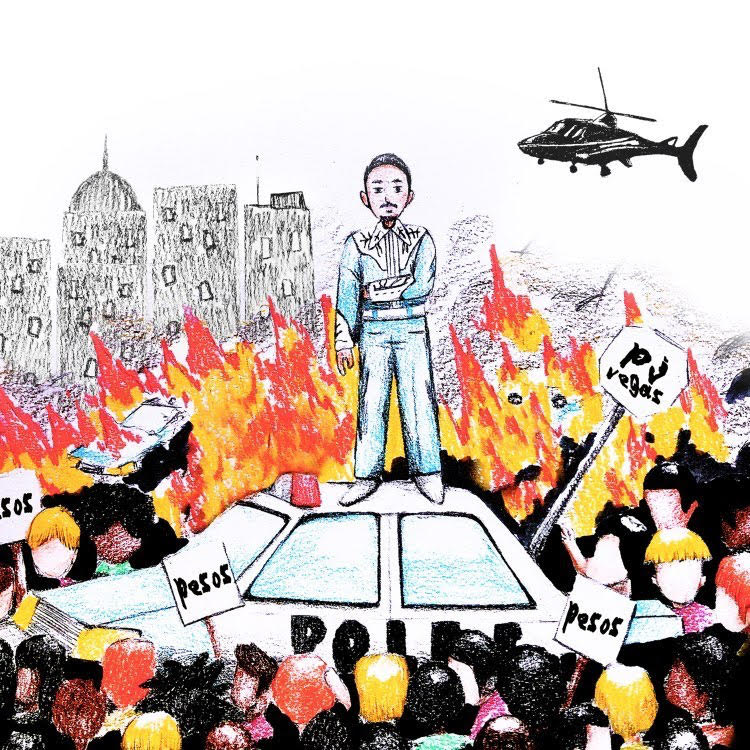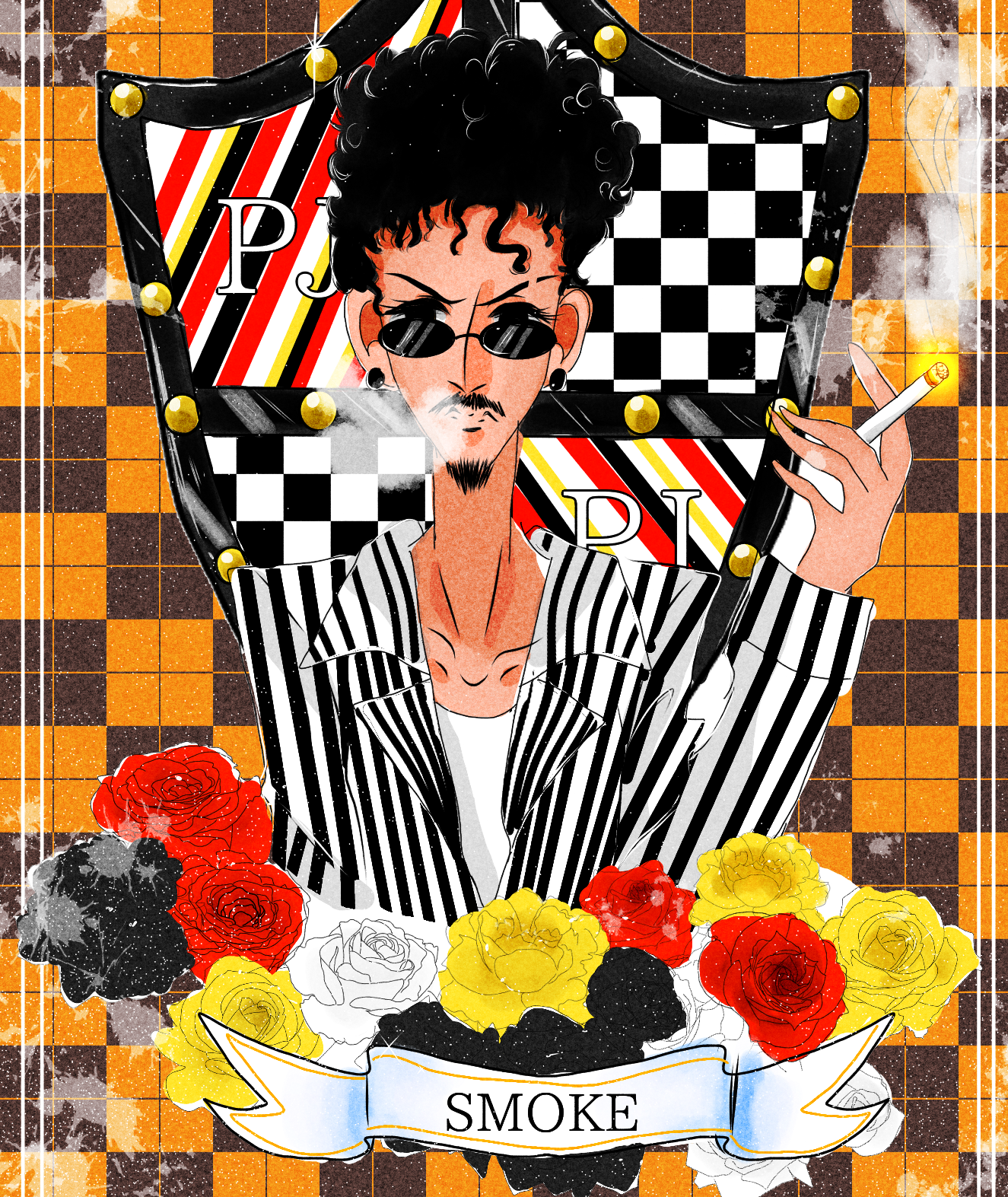Award-winning Yaqui/Mexican Native indie artist, PJ Vegas, has been making waves in the music industry. As the son of Pat Vegas – the legendary founder of Native American, Billboard Top 100-charting band REDBONE – music has always been at the forefront of PJ’s life. The Los Angeles-based musician – best known for his sultry vocals, gritty content, and suave style – has quickly become a master of his craft and has recently released a new single from his upcoming LP, titled “Pesos.” While music has always been a prominent part of PJ’s life, he has also made mental health another one of his priorities, especially when it comes to his music. Music and mental health intersect as music relaxes the mind, energizes the body, and improves one’s mood. PJ’s music has been influential throughout his own mental health journey as well as providing healing for others who may not have another outlet for their own mental health struggles. His mental health has changed his approach to the music he makes, making his songs all the more special because they come from the heart. For PJ, music acts as a therapist and greatly helps his mental state, and he hopes that it can do the same for others that listen to it. PJ stands out as an artist in the industry because he wants to show people the real meaning of music, which, to him, is how it makes you feel.
PJ is proud to be one of the first Mexican Native RnB singers to be recognized in the industry by MTV, having won the Video Music Award for “Best Video With a Message” in 2017. Since then, he has continued to make waves as an indigenous artist. In 2018, PJ won a Native American Music Award for Best Independent Single. He is an unwavering advocate for his community, having planned Indigenous People’s Day in Los Angeles for the past two years, proudly merging his passions for music and social justice. PJ has used his music as a vessel for healing for several different communities, but more specifically, it has impacted native communities. His music gives a voice to those who may feel unheard, which is an incredibly important aspect of being an advocate for minorities as well as anyone struggling with mental health. PJ’s focus on how his music can connect to improved mental health and be used as a healing voice for different communities has helped differentiate himself from other artists. He uses his music to inspire and motivate and get people thinking, which will hopefully open a bigger narrative regarding how other artists use their music as a positive outlet for mental health awareness.
PJ has been putting in work in terms of his music and just released his new track, “Pesos,” on July 4th. There has never been a greater time to celebrate diversity and amplify minority voices in America, which is why PJ chose this special holiday to drop the first single in his upcoming LP, “Smoke.” The song’s melody pays homage to PJ’s Mexican heritage and American roots, effortlessly interweaving all of the musical influences that make up his unique sound. His first mixtape titled “Priceless: The Free Album,” released in 2013, received rave reviews from numerous music critics, further solidifying himself as a force to be reckoned with in the music industry. His LP, “Smoke,” will undoubtedly continue to further his career.
The artist spoke with us exclusively about his music and its connection to mental health, how he uses his music to advocate for mental health awareness, and how he uses his music to celebrate diversity. PJ has quickly become a well-known voice in the music industry, and we are excited to see what he does next.

What first got you into music?
Growing up in a house filled with musicians I grew a love for it at an early age
Who inspired you to make music?
My father and uncle Pat and Lolly Vegas were the founding members of the native rock group REDBONE known for the hits like “come and get your love” they molded me into the artist I am today for sure.
What kind of impact do you think music can have on celebrating diversity and amplifying minority voices?
Music is a universal language that I feel has given marginalized communities and minorities a voice to express themselves on a large scale. What we do with that platform and what message we convey to the public is on us. It’s about telling our own stories and creating a narrative that is true to who we are as indigenous people.
How have you used your music to celebrate diversity?
Using traditional sounds from my people (Yaqui nation) and fusing it with a mainstream approach, I feel it has opened a lot of people’s eyes to what we offer to music as an indigenous artist, and the word is catching on.
You use your music to pay homage to your Mexican heritage as well as your American roots, how do you think this has impacted your music?
I feel it took my music to the next level. It’s authentically me and a great representation of what we can do.
Has championing diversity always been important to you in your life as well as your music?
Yes, it has. I feel it’s been my family’s mission in music since the beginning is having proper representation, and the reaction from the people shows me that I’m on the right track.
How has diversity played a part in your career?
All I knew growing up in Los Angeles is diversity, and my music is definitely influenced by many different cultures and ethnicities; without that, I wouldn’t be who I am today.
How have you been an advocate for the Native American community?
I’m very involved in my community from lending my musical platform to speaking on Native issues that get overlooked by mainstream media to community organizing for the last two years in my hometown of Los Angeles I have produced the Indigenous Peoples Day event in front of City Hall along with the 13th district and city Councilmember Mitch O’Farrell to create that platform.
What caused you to be passionate about social justice?
I’m just one voice in a crowd of many that are advocating for social injustice. I use my platform anyway I can to bring awareness, and I will always do so. My father and uncle have been doing it since the 70s, and here in 2020, the same fight still continues.
How do you think music impacts mental health?
Music definitely impacts mental health. The constant seeking of validation, the likes, the repost, maybe not getting the reaction from the consumer that you expected, it all plays a part. I learned if you released that in the very beginning and just focus on the music and making it the best as possible you avoid things like that.
Do you think music artists put enough emphasis on the importance of mental health?
I think there are a few artists who speak truths about not letting people’s perception of you dictate your happiness, but at the end of the day, people are going to do what they wanna do, and validation in this industry is the most sought after thing there is.
As a well-known figure in the music industry, how do you use your music to advocate for mental health awareness?
I feel like my music is created to inspire and motivate and to get people thinking. That’s the way I feel like I’m contributing to the real meaning of music, which is how it makes you feel.
Has your mental health changed your approach to the music that you make?
Definitely, it’s my escape and used as my therapy at times, helping me get through situations that otherwise would have been detrimental to my everyday living.
How do you prioritize your mental health while also putting a significant amount of time and effort into your music?
I feel like music helps my mental state. Without it, I feel like I would have way too much emotion to process without an outlet. Some music definitely acts as my therapist.
What’s something people may not know about you?
My father and uncle Pat and Lolly Vegas were the founding members of the first Native American rock group REDBONE to go number one on Billboard.


